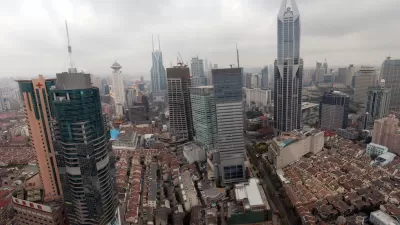Research suggests China’s current urbanization policy forgoes $2 trillion in growth over the next ten years. That is, unless the government funnels even more migrants into major population centers and develops for density.
Top Chinese economists have joined the chorus supporting dense urban development. Current Beijing policy, they argue, hasn’t done enough to grow the most populous cities. The prevailing policy seeks to limit overcrowding and environmental impacts in cities like Beijing, Shanghai, Guangzhou, and Shenzhen by funneling migrants into smaller cities, generating sprawl.
Proponents of the Chinese mega-city want to build up rather than out, citing the higher economic efficiencies of cities like Tokyo and Seoul. From the article: “An additional 4.2 million people can be added to Guangzhou and 5.3 million to Shenzhen if those cities had the same population density as Seoul, according to a March report by the World Bank and the State Council’s Development Research Center.”
The key to making these densities work is upgraded urban infrastructure, transportation in particular. By focusing on dense development instead of sprawl, China could save “$1.4 trillion from a projected $5.3 trillion in infrastructure-spending needs during the next 15 years.” This money could then go into mass transit and other density-friendly techniques, remedying China’s infamous smog problem in the process.
Despite these calls, Beijing seems poised to uphold limits on mega-city growth.
FULL STORY: Why China's Gigantic Cities Are Just Too Small

Planetizen Federal Action Tracker
A weekly monitor of how Trump’s orders and actions are impacting planners and planning in America.

Maui's Vacation Rental Debate Turns Ugly
Verbal attacks, misinformation campaigns and fistfights plague a high-stakes debate to convert thousands of vacation rentals into long-term housing.

San Francisco Suspends Traffic Calming Amidst Record Deaths
Citing “a challenging fiscal landscape,” the city will cease the program on the heels of 42 traffic deaths, including 24 pedestrians.

Defunct Pittsburgh Power Plant to Become Residential Tower
A decommissioned steam heat plant will be redeveloped into almost 100 affordable housing units.

Trump Prompts Restructuring of Transportation Research Board in “Unprecedented Overreach”
The TRB has eliminated more than half of its committees including those focused on climate, equity, and cities.

Amtrak Rolls Out New Orleans to Alabama “Mardi Gras” Train
The new service will operate morning and evening departures between Mobile and New Orleans.
Urban Design for Planners 1: Software Tools
This six-course series explores essential urban design concepts using open source software and equips planners with the tools they need to participate fully in the urban design process.
Planning for Universal Design
Learn the tools for implementing Universal Design in planning regulations.
Heyer Gruel & Associates PA
JM Goldson LLC
Custer County Colorado
City of Camden Redevelopment Agency
City of Astoria
Transportation Research & Education Center (TREC) at Portland State University
Jefferson Parish Government
Camden Redevelopment Agency
City of Claremont



























